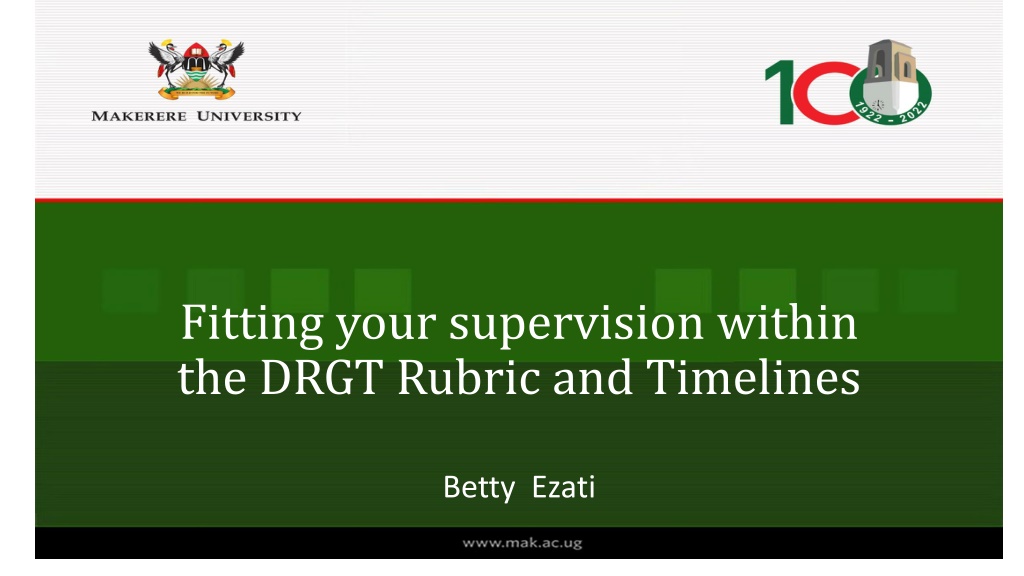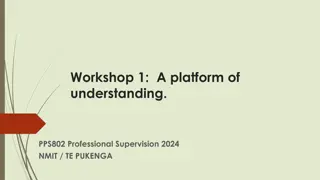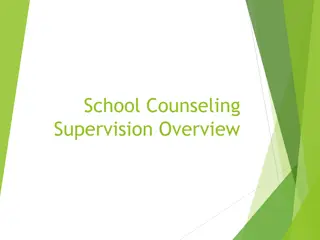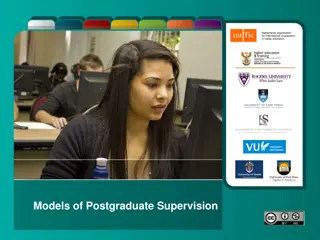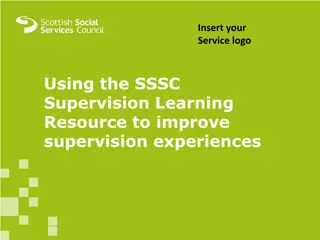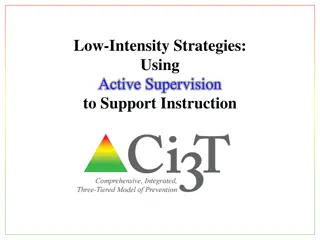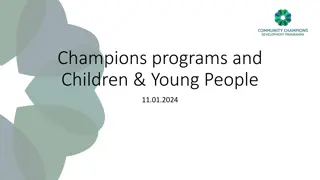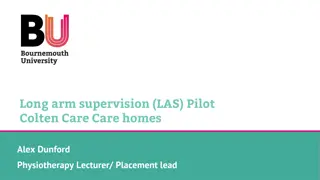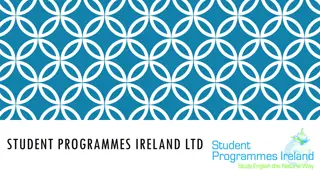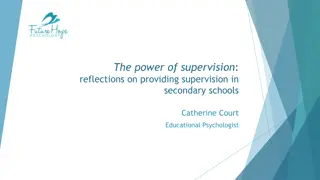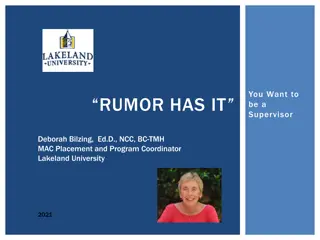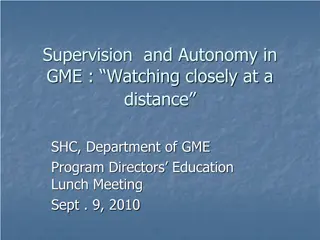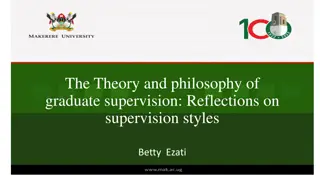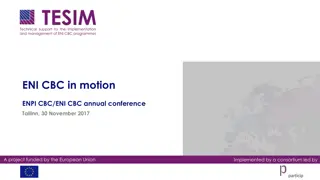Effective Supervision Strategies for Graduate Programmes and Research Projects
Establishing supervision practices aligned with the DRGT rubric and timelines is crucial for the successful completion of graduate programmes at Makerere University. This comprehensive guide covers the essential requirements for coursework, dissertations, project reports, and study plans across different semesters. It emphasizes the importance of seminar series, project presentations, and regular committee reviews to ensure timely progress and adherence to academic standards. The study plan's structured approach facilitates students in navigating the complexities of research methodology, proposal development, data collection, analysis, and thesis writing. Additionally, insights into maintaining a balance between academic pursuits and personal life preferences of students are provided.
Download Presentation

Please find below an Image/Link to download the presentation.
The content on the website is provided AS IS for your information and personal use only. It may not be sold, licensed, or shared on other websites without obtaining consent from the author. Download presentation by click this link. If you encounter any issues during the download, it is possible that the publisher has removed the file from their server.
E N D
Presentation Transcript
Fitting your supervision within the DRGT Rubric and Timelines Betty Ezati
Makerere Univ. graduate programme Plans Plan A: Course Work and Dissertation: A student must: 01 02 03 04 Complete coursework consisting of a minimum of 18 Credit Units during the year Seminar Series will be mandatory. Students must present Submit a Dissertation (8-10 CUs) External examination of Plan A Dissertation shall be mandatory
Makerere Univ. graduate programme Plans A student must complete coursework that shall constitute 75% of the entire workload for the Degree. A Student must submit a Report on a supervised Short Project/Field Attachment/Industrial Training carried out. (300 hours equivalent to 8 weeks; 5CU) External examinations of Projects/Reports shall be done as in course work. Seminar Series will be mandatory
Study Plan Semester 1 Provisional Registering - Colleges/Schools/ Department/Unit. Attendance of relevant courses, including cross-cutting courses Research methodology; Proposal writing, Scholarly writing, etc. Developing draft proposal Developing Research Instruments Review of the Draft proposal by the Doctoral Committee Review of the study plan with guidance from supervisor(s). Semester 2 Attendance of discipline specific course Development of full proposal and presentation to the Doctoral Committee. Presentation of full proposal to the School Higher Degrees and Research Committee (students may be discontinued if they fail at this level, however, they may be allowed to appeal). Presentation of progress report. Revision of the reviewed study plan. Provisional registration / Full registration.
Study Plan Semester 3 Registration for the semester - School/Department and DRGT with a developed proposal. Laboratory / fieldwork, data collection. Presentation at seminars Review of study plan. Semester 4 Attendance of courses where applicable. Continued Field/ Lab work. Data analysis Presentation in a seminar Draft chapters Review of Study plan. Presentation of the first paper.
Study Plan Semester 5 Development of a draft or outline of thesis. Commencement of the writing process/ Data analysis. Presentation at seminar/DC. Review of Study Plan. Presentation of a second paper Publication of a paper Semester 6 Finalising of writing. Final seminar presentation to DC. Submission of thesis/dissertation. The Examination process. The public (open) defence/Viva voce examination.
Our students keep focus on the course. They don t like interference in family life 01 Businesslike Personal oriented 02 Less discussion on PhD Prefer to work alone. Few meetings Independent student 03
The - Want personal touch. They social- emotional bonds, with trustful and fluid arrangements. - Prefer meetings which start with small talk - like to share experiences beyond the PhD work. - Want continuous advice on their performance, with attention to their personality; Expect a lot of detailed, to-the-point suggestions for improvements. personal- interest, interactive student
Supervisor and students expectations Students To be independent Present written work that is not just a first draft (hence more a product than a process style of management). Regular meetings with their PhD students Honesty about progress reporting Their advise to be followed Be excited about their work Supervisors to: Read their work well. Constructively critical, Good knowledge of the research area Willing to share their knowledge Be available when needed, Are friendly, open and supportive Be role models, Act in their best interest
Supervision style Businesslike- process oriented Delegator Styles Friend (more personal Coach-focus on content Expert guide-high intensity, process oriented. Supervisor distances self from personal issues Editor
Year 1 The first year of candidature is crucial negotiate a mix of formal and informal interactions Build relationship Provide relevant sources of expert advice Encourage self-confidence and simultaneously monitors progress 1
Subsequent years Frequent interaction reduces and the relationship becomes more like a peer relationship. consistently encourage and assist candidates to draft thesis text, and to publish and present their research in journals and at conferences
Pedagogy of good supervision 01 02 hands off hands on - Candidates left largely to their own devices. Assumption confident, independent, knowledgeable, skilled, organised go through a number of iterations of thesis and publication drafts with candidates - supervision tend to be associated with faster and more completions.
How can we ensure students meet timelines One to one: provides personal attention and nurturing tailor work to fit the needs, interests, and issues of a particular student provide the much-needed safety and privacy Group supervision: build confidence and peer support Good for student who enjoy the experience of learning and sharing amongst their peers foster collaborations involve academics and other experts in candidates research e.g. presentation to others
Mouton gives five general rules for a healthy and successful relationship dignity, respect and courtesy no harassment accessibility Privacy and honesty
Chemistry between student and supervisor The success of a supervisor-PhD candidate relationship partly depends chemistry between supervisor and PhD candidate. Any incompatibility affects completion During the process PhD candidates tend to know more about the details of a research topic than their supervisors, which can threaten the relationship
THANK YOU FOR LISTENING THANK YOU FOR LISTENING
